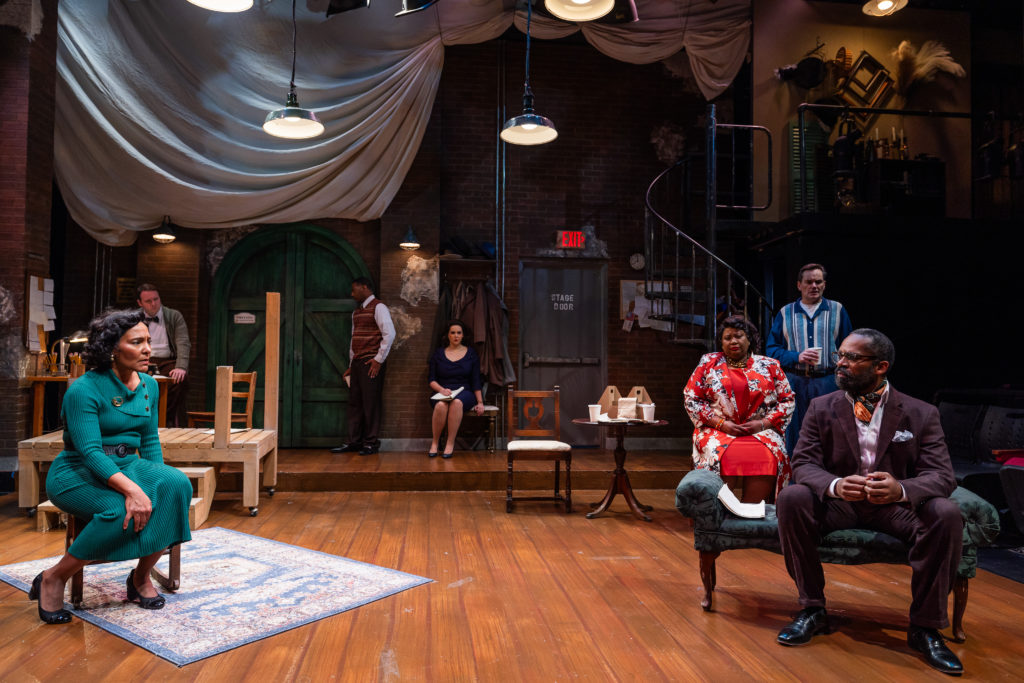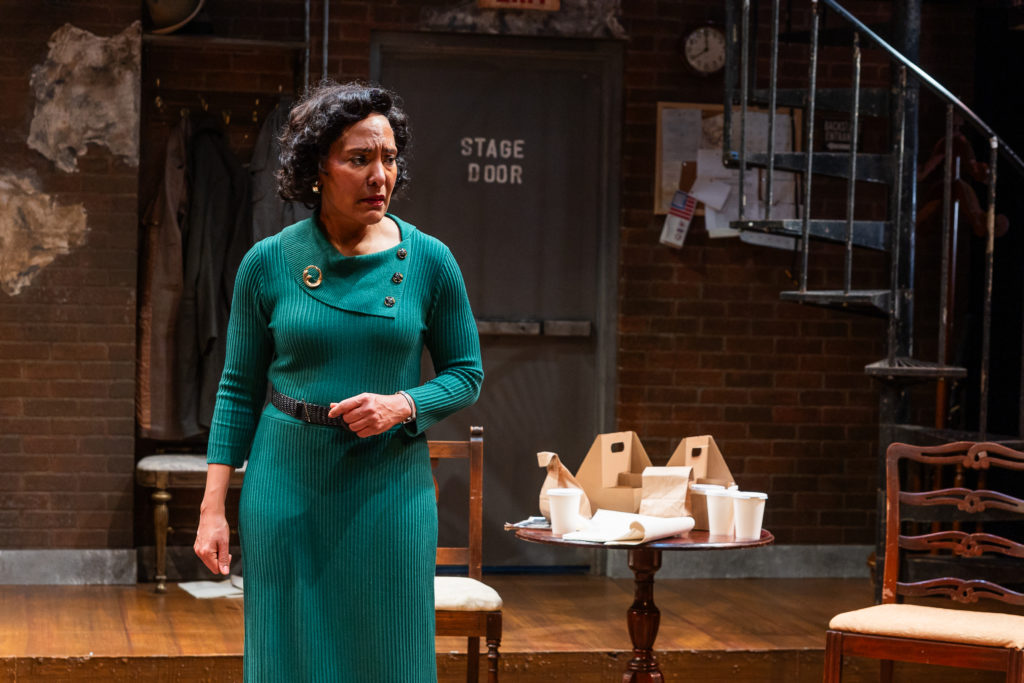
Patrice Jean-Baptiste, James Turner, Kadahj Bennett, Allison Beauregard, MaConnia Chesser, Bill Mootos, and Davron S. Monroe in Trouble in Mind. Photo by Nile Hawver Nile Scott Shots.
Presented by Lyric Stage Boston
By Alice Childress
Directed by Dawn M. Simmons
Featuring Barlow Adamson, Patrice Jean-Baptiste, Allison Beauregard, Kadahj Bennett, McConnia Chesser, Davron Monroe, Bill Mootos, James Turner, and Robert Walsh
January 12 – February 4, 2024
Lyric Stage Company theatre
140 Clarendon Street
2nd Floor
Boston, MA 02116
Running Time: 2 hours and 20 minutes, including a 15-minute intermission.
Masks are strongly recommended in the theater.
Critique by Kitty Drexel
Content warning: Overt racism, sexism, identity, class, micro and macro-aggressions, implied casting couch situation, mansplaining
“Psalm 23”
23 – The Lord is my shepherd; I shall not want.
2 He maketh me to lie down in green pastures: he leadeth me beside the still waters.
3 He restoreth my soul: he leadeth me in the paths of righteousness for his name’s sake.
4 Yea, though I walk through the valley of the shadow of death, I will fear no evil: for thou art with me; thy rod and thy staff they comfort me.
5 Thou preparest a table before me in the presence of mine enemies: thou anointest my head with oil; my cup runneth over.
6 Surely goodness and mercy shall follow me all the days of my life: and I will dwell in the house of the Lord forever.
The King James Bible
BOSTON, Mass. — Trouble in Mind at the Lyric Stage in Boston is about the making of a play within a play. It is a well-constructed production. Exceedingly well acted. Beautifully curated. It hurt my heart to watch.
Theatre has the unfortunate job of telling stories that must be told so we remember the ongoing pain of others. Trouble in Mind reminds us that it isn’t enough to be nice and to mean well. To make the world a better place for everyone, we must be diligent against the forces that would oppress us. We don’t get to pat ourselves on the back for watching this one.
Summary: The cast and crew of Chaos in Belleville are trying to bring their “progressive” new show about the horrors of lynching to Broadway’s white audiences. It has Black people in it, but it is not about their historical experience of lynchings.
Wiletta (Patrice Jean-Baptiste in a tour de force performance for the ages) is an actress making her Broadway debut in a cast of fresh faces and seasoned experts. As she builds her character Ruby from caricature concept to realistic character, she’s caught between appeasing the white, casually racist theatre management and expressing truth on the Broadway stage.
Her producer/director Manners (Barlow Adamson), and castmates John (Kadahj Bennett), Sheldon (Davron S Monroe, skillfully executing age acting), and Bill (Bill Mootos) repeatedly push Wiletta, not to perform her character, to justify her character’s choices. They do not listen to Wiletta when she does. Their mansplaining and her entirely reasonable pushing back culminate in an explosive moral reckoning for the entire production.
Castmates Millie (MaConnia Chesser) and Judy (Allison Beauregard) work to keep the peace in their own ways. Theater staff Eddie (James Turner) and Henry (Robert Walsh) have the theatre’s best interests in mind.
Trouble in Mind is not a conversation starter. It is the conversation. It’s from 1957, but it has lessons for all of us today: same BS, new century.
So little has changed in nearly 70 years. Black characters in this play discuss racial tensions and racial politics; they discuss the irritability of their white employers and coworkers; they share tactics for appeasing their white employers and coworkers. They do their best to remain jovial so they don’t appear uppity, lazy, angry, or difficult.
Watching Trouble in Mind was difficult. One feels powerless to end racism – a concern Manners and Judy express in Childress’ play. Manners even rants in a jarring, third-act monologue about how he can’t possibly have privilege (that Adamson performs with sincerity despite its heinousness). Manners has worked hard for his position. He has to beg for production funds; his ex-wife is greedy; directing is hard.
Manners speaks as if he’s special for working hard. He’s not. Even billionaires with intergenerational wealth protecting their investments, quality of living, and business relationships think they work hard (naw).
Everyone works hard. We have to because life is hard. Manners’ blissful ignorance marks him as an insensitive bigot.
White privilege doesn’t mean white people don’t struggle. Merriam-Webster tells us it means we have economic and social advantages that BIPOC aren’t afforded because of their race. It means we can arrive in a room, and no one questions why we’re there. It means that our struggle isn’t more difficult because of negative stereotypes inferred by the color of our skin, our heritage, or our country of origin. It means we aren’t lynched for pursuing our happiness.
The intricate set design by Shelley Barish encompasses the entire Lyric Stage theatre. From the pencils on the stage manager’s desk to the light fixtures in the entryways, we’re reminded where we are and what’s at stake.
Ticket buyers should note that a raised, false false proscenium above center stage may block some views of the upstage right and left scenes. The proscenium won’t disrupt your experience but craning your neck might to see around it might.
Alice Childress chose to end Trouble in Mind with an example of Wiletta’s resilience. Jean-Baptiste performs Psalm 23 as a restorative and triumphant monologue near the end of the show. Jean-Baptiste inspires hope with her work.

Patrice Jean-Baptiste in Trouble in Mind. Photo by Nile Hawver Nile Scott Shots.
Wiletta fights an uphill battle. Jean-Baptiste proves that, while Wiletta’s story is true, it can change. It must change. A theatre without more performances like Jean-Baptiste, Monroe, Bennet, and Chesser’s is a lesser theatre for all.
Black people still have to work harder to get halfway as far as their white colleagues. Discussions of equity and justice are ongoing by necessity. If you leave Trouble in Mind with nothing else, leave with that.
